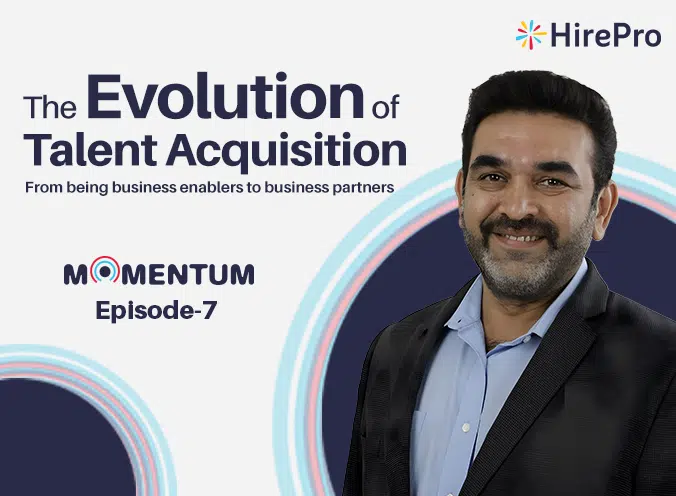
HirePro Momentum Episode 7 | Elevating Talent Acquisition: From Enabler to Partner With Mr. Zakee Sheikh, Head Talent Acquisition – Cummins India
In today’s fast-paced business landscape, talent acquisition has emerged as a key driver of growth, innovation, and success. No longer just about filling vacancies, talent acquisition teams now play a strategic role, aligning hiring strategies with business objectives. AI and automation amplify efficiency, requiring recruiters to evolve into trusted advisors. In this episode, we explore the seismic shift in talent acquisition, from tactical recruitment to strategic business partnership.
Join us as we uncover how forward-thinking organisations harness talent acquisition to propel business growth and discover the future of hiring with Mr. Zakee Sheikh, Head of Talent Acquisition at Cummins India. He shares his 20+ years of expertise in optimising and transforming talent acquisition operations. With a focus on technology, process excellence, and stakeholder partnerships, Mr. Zakee has helped organisations build diverse workforces and enhance candidate experiences.
This episode explores five critical aspects of talent acquisition: its evolution from transactional to strategic, technology’s role in optimising hiring metrics, building diverse workforces through partnerships, enhancing candidate and hiring manager experiences, and its impact on driving business success.
Subscribe to our YouTube and Spotify channels for more insightful conversations on the future of recruitment, tech adoption in hiring processes, college hiring, and innovation.
You can also tune in to the audio version on Spotify below
Frequently asked questions
Question: How has talent acquisition evolved over the years?
Answer: Talent acquisition has shifted from traditional hiring methods to technology-driven recruitment. The need for faster, more efficient processes and a better candidate experience has led to the adoption of AI, automation, and other technologies.
Question: What are the core pillars of talent acquisition today?
Answer: The key pillars are time to hire, cost of hire, quality of hire, and the candidate and hiring manager experience. These factors help align recruitment strategies with business objectives.
Question: How can talent acquisition teams become strategic partners to the business?
Answer: Talent acquisition teams can evolve by understanding business goals, working proactively with stakeholders, and developing annual recruitment strategies. This enables them to anticipate hiring needs and drive business outcomes, transitioning from enablers to strategic partners.
Question: What impact do technology and AI have on talent acquisition?
Answer: AI and technology have transformed about 50% of recruitment processes, automating tasks like sourcing, screening, and interview scheduling. This frees recruiters to focus on strategic activities like candidate engagement and consulting with hiring managers.
Question: How can organisations shift from hiring for experience to hiring for potential?
Answer: Companies should prioritise skills and potential over experience, value diversity, and broaden the scope of candidate backgrounds. A talent advisor can guide businesses to embrace bold recruitment decisions and build a more dynamic workforce.
Question: What emerging technologies are shaping the future of recruitment?
Answer: Generative AI, assessment tools, interview scheduling tools, and CRM systems are key technologies that are transforming talent acquisition by automating administrative tasks and improving candidate evaluations.
Question: Will technology replace recruiters in the future?
Answer: No, technology will not replace recruiters. Instead, it will enhance their capabilities, allowing them to focus on strategic areas such as candidate assessment, stakeholder management, and business advising.
Question: What role does diversity play in modern recruitment strategies?
Answer: Diversity is a critical component of recruitment today. Companies prioritise diverse hiring to bring in varied perspectives and skills, which can lead to greater innovation and better problem-solving.
Question: How can recruiters maintain the human touch in a tech-driven hiring process?
Answer: By leveraging technology to handle administrative tasks, recruiters can devote more time to building personal connections, understanding candidate needs, and acting as trusted advisors to both candidates and hiring managers.
Question: What is the future outlook for talent acquisition by 2030?
Answer: By 2030, around 60% of recruitment processes will be automated. Recruiters will evolve into talent advisors, focusing on strategic partnerships, candidate experience, and aligning recruitment with broader business goals.